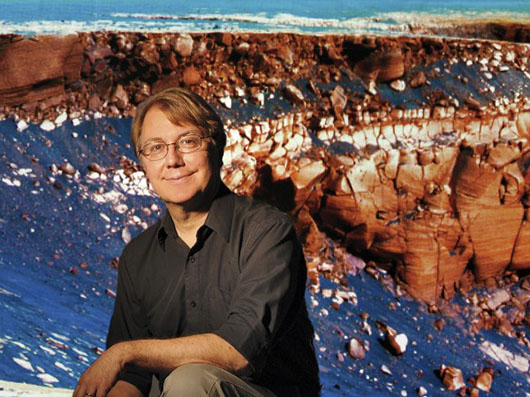The deep history of life

Andrew Knoll, Fisher Professor of Natural History and Professor of Earth and Planetary Sciences at Harvard University, will arrive in St Andrews next week to deliver a lecture reaching far back in time; beyond the 600 year history of Scotland’s first university, beyond the 600 million years of animal evolution, to the earliest chapters of Earth history.
Professor Knoll will deliver his lecture as part of the University of St Andrews’ 600th Anniversary Lecture Series on Thursday October 10, 2013 at 1715 hours in the Medical Sciences Building Lecture Theatre, North Haugh, St Andrews. Attendance is free and all are welcome. The lecture will be followed by a free drinks reception.
Our planet is some four and a half billion years old – what kinds of organisms characterised our planet’s youth and middle age? How do we establish the nature of life and environments on the early Earth? Professor Knoll will attempt to answer these questions and more, drawing on the evidence of comparative biology, rock chemistry, and palaeoecology.
Professor Knoll will reveal how, 2,400 million years ago, the initial accumulation of oxygen in the atmosphere and surface oceans opened a new chapter in Earth history: one in which bacteria were joined by the first protozoans, in oceans with moderate oxygen in surface waters but oxygen-free waters below.
Only with a further increase in oxygen, less than 600 million years ago, did our familiar world of animals and plants begin to take shape.
Speaking ahead of his lecture Professor Knoll said:
“The evolutionary process really began with the origin of life, perhaps 4 billion years ago, and then continued with organisms whose size and shape and complexity was similar to what we would recognize as bacteria today. Over long periods of time, more complex cells arose. They then formed multicellular consortia that ultimately became functioning animals with tissues. We, along with everything else that’s alive today, are the product of this 4 billion years of evolutionary history.”
Professor Knoll has received numerous awards for his work including being named one of CNN/Time America’s Best scientists in the USA, is a Member the US National Academy of Sciences, receiving the NASA Group Achievement Award, winning the Wollaston Medal of the Geological Society of London, and the Phi Beta Kappa Book Award in Science.
Notes to News Editors
The University of St Andrews 600th Anniversary spans three calendar years from 2011 to 2013, marking the formal charter granted by Bishop Henry Wardlaw in February 1411 and the achievement of full university status conferred by Pope Benedict XIII by Papal Bull in 1413.
The University of St Andrews’ 600th Anniversary Campaign was launched on February 25, 2011 by St Andrews alumnus and Campaign Patron Prince William.
The anniversary campaign is a £100m philanthropic fundraising appeal. The Appeal will lay the foundations for a seventh century of exploration and allow the University to continue to invest in people, ideas and excellence.
Category University news